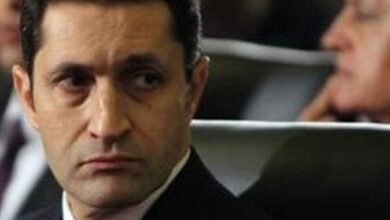Although he was forced to resign as prime minister in the face of raging protests just one year ago because of his ties to Hosni Mubarak’s regime, Ahmed Shafiq defiantly returns to the scene to run in Egypt’s first post-Mubarak presidential election slated for 23 and 24 May.
With a hoarse voice and the quick temper of a military man, the question is whether Egyptians will vote for Shafiq to become yet another president from the military, especially since the most prominent chant heard in the streets over the past few months has been “Down with military rule,” a sentiment Shafiq believes doesn’t represent the opinion of the majority.
Hailing from a military background
The 71-year-old Shafiq graduated from the Egyptian Air Force Academy in 1961 and joined the air force at the age of 20. Later in his career, he earned a master's degree in military science and a PhD in the national strategy of outer space.
He came from a family of government officials. His engineer father, Mohamed Shafiq, served as irrigation minister, and the father of his wife, Azza Tawfiq Abdel Fattah, was a social and labor affairs minister.
Shafiq fought in three wars, the North Yemen Civil War in 1962, the War of Attrition with Israel between 1967 and 1970, and the 1973 war with Israel, during which he served under the command of then-Commander of the Air Force Hosni Mubarak.
From 1984 to 1986, Shafiq served as the military attache in the Egyptian Embassy in Rome. In September 1991, he was appointed chief of staff of the air force, holding this position until April 1996, when he became the air force commander.
In 2002, Shafiq became the country's first civil aviation minister when Mubarak issued a decree to form the ministry, after it had been attached to other ministries for 28 years. The decision was criticized by the opposition, which accused Mubarak of tailoring the position especially for Shafiq after the latter refused a post as Egypt’s ambassador to France.
Shafiq survived a cabinet change in 2005 and thus served as the minister for ten years until 2011, when Mubarak asked him to form a new government on 29 January amid the popular uprising that erupted on 25 January. He lasted only one month in that position.
Shafiq has relied on his military background and successes in the Civil Aviation Ministry to sell himself to the public in his presidential campaign. During his ten years heading the ministry, he was one of the few ministers whose performance was praised by both the regime and some opposition figures, journalists and writers. Some voices had called for him to be appointed prime minister or even vice president in the last few years of the Mubarak regime.
In his ministry, Shafiq was known for iron-fist management and a tendency to control its different activities by himself. He frequently changed the management and was never hesitant to replace any person who fell short of expectations.
He also embarked on an ambitious restructuring plan for EgyptAir, the country’s national carrier. He was able to achieve a turnaround in the company's performance, making it the leading carrier in the Middle East and Africa, securing in 2008 a membership in the Star Alliance, the world's first and largest airline coalition.
During his office term, the lieutenant general also effectively renovated Egyptian airports, transforming Cairo International Airport into a regional hub through the inauguration of Terminal 3 in 2008 and opening Terminal 2 at the Sharm el-Sheikh International Airport.
However, all this glitter might not turn out to be gold. Employees at the Civil Aviation Ministry and EgyptAir Holding Company have filed more than 40 lawsuits against Shafiq since the uprising, accusing him of corruption and squandering public funds. However, the fate of these cases remains unknown, especially since the public prosecutor transferred them to the military prosecution in May, and Shafiq was never summoned for interrogation.
Some of these cases allege that after the Civil Aviation Ministry borrowed LE3.3 billion from the World Bank to construct Terminal 3, its operation has taken annual losses of more than LE500 million. They also accuse Shafiq of squandering funds by investing more than LE100 million in building two malls next to the Cairo and Sharm el-Sheikh airports, projects that failed to generate any revenue. Selling vast tracts of ministry land to some businessmen at cheap prices is also among the accusations.
Shafiq has denied these allegations in several media appearances, describing them as “malicious.”
Distancing himself from the revolution
Shafiq makes it no secret that he was one of Mubarak’s men. He defended the former president to the last minute before he stepped down on 11 February 2011.
“I know him as much as I know myself,” Shafiq said of Mubarak in a TV interview on 1 February, unable to hide his tears after watching Mubarak’s last speech pledging to remain in office and announcing he would not run for another presidential term. “[The revolutionaries] took the Tunisian catalogue and are applying it here in Egypt. But we are in Egypt, not Tunis,” he said at the time.
He added: “Anyone who ever dealt with the president knows very well that he is patriotic to the bone and that if anyone swore to me that [Mubarak] will leave the country, I would never believe that. Mubarak will die on Egyptian soil.”
Shafiq didn’t exactly side with the revolutionaries during the 18-day uprising. His indifferent media statements as prime minister at the time angered many protesters. One example was when he tauntingly offered to distribute candies to protesters in Tahrir Square, a statement that could either be blamed on utter spontaneity or conceit.
He even went so far as to question their legitimacy. “The Egyptian people were not all in Tahrir, they were in their homes,” he said.
Many of Shafiq's other media appearances turned out this way. His angry statement while defending his patriotism in television appearance ― “I fought in wars, killed and was killed” ― became a running joke for months.
Shafiq refused to refer to the popular protests as a revolution or uprising during the 18 days, rather preferring to describe them as a collective expression of anger. He also blamed the protests for the country's worsening economic and security conditions. However, this appeared to change after the Battle of the Camel, when pro-regime men riding camels and horses attacked Tahrir Square on 2 February, killing eight people. This seemed to strike a particular blow to Shafiq, who had come out on television the day before promising that people in Tahrir would not be harmed.
“I swear on my life, no one will harm the Egyptians in Tahrir Square,” he had said.
Today, Shafiq completely denies any responsibility for the attack, saying he didn’t know about it until the end of the day.
“It was not under my responsibility. I didn’t have control of any of the state agencies. The president, the intelligence and the armed forces should be asked about that,” he said four days after being appointed prime minister.
Shafiq today downplays the effect on his presidential candidacy of the protests that forced him to resign on 3 March 2011.
“Maybe I was not accepted a year ago, but things change,” said Shafiq in a TV interview a week ago. He also claims that he is on good terms with the revolutionaries today.
“Half of the people in Tahrir now call me and visit me at home, while some tell me that they were deceived,” he said. “There was a plot to topple me,” he continued.
Standing alone
Although Shafiq does not have much political backing, he seems quite confident of his success. Shafiq is not very popular with the Islamist forces that dominate nearly 70 percent of the legislative branch of government. The website for the Muslim Brotherhood, whose Freedom and Justice Party has the biggest number of parliamentary seats, ran a long report last month accusing Shafiq of allowing the “corrupt ministers” of Mubarak to transfer money abroad during his short term as prime minister, among other accusations of squandering state funds and favoring army generals in the Civil Aviation Ministry with disproportionate salaries.
The Nour Party, which has the second-most seats in Parliament after the FJP, has said Shafiq asked for its endorsement. Shafiq denied this. That ultra-conservative Islamists would seem to have little in common with Shafiq, and more religious candidates have already declared their intention to run, calls Shafiq's claim into question.
In a similar vein, liberal Wafd Party leader Al-Sayed al-Badawy said last week that Shafiq has a slim chance of support from his or other liberal parties. Wafd now plans to support Mansour Hassan, who has headed the military government's Advisory Council for the last few months. Similarly, Shafiq doesn’t appear to have a chance with leftist forces, especially considering his neoliberal economic outlook and ties with the toppled regime, and since leftists are gathering around their own candidates.
But Shafiq is looking for support elsewhere. “I am not dependent on a certain political bloc; I target the average Egyptian family with all its age levels,” he said on TV recently.
Shafiq’s ties to the Mubarak regime are not only institutional. Many perceive him as sharing the same authoritarian and patriarchal values of other Mubarak-era figures. These have been most manifest in his TV appearances and staunch rejection of any criticism. Many see Shafiq in the same corner as long-time diplomat Amr Moussa: strongmen hailing from the old regime and, despite this connection, acting as statists needed to restore stability.
His campaign is described by some as schizophrenic. In one bizarre event, he rode a white horse into a campaign rally in a Luxor Governorate village. This was meant to promote him as a conservative 'man of the village' who will lead Egypt in its renaissance. His attire in this occasion sharply contrasted with his more casual appearances on television, where his wardrobe of colorful pullovers has also caused laughter nationwide.
Many accuse Shafiq of being supported by the Supreme Council of the Armed Forces, specifically its head, Field Marshal Hussein Tantawi, especially after Shafiq mentioned that he had consulted with the latter when trying to decide whether to join the presidential race. As Tantawi’s 21-year companion, Shafiq vehemently avoids talking about or criticizing the SCAF.




